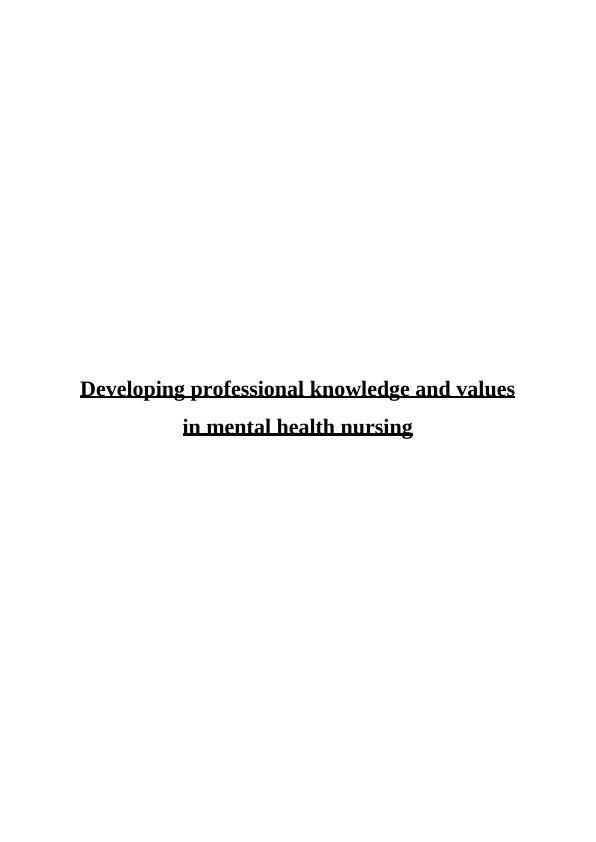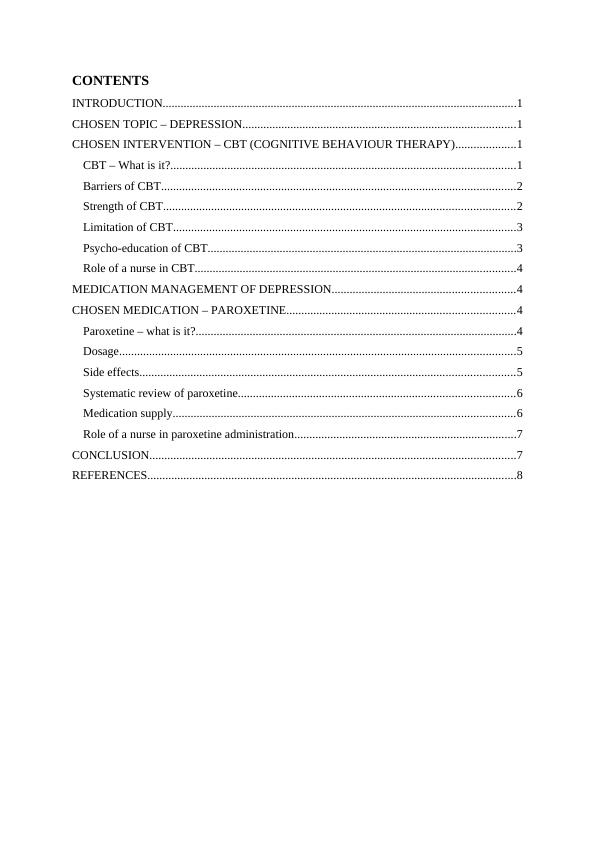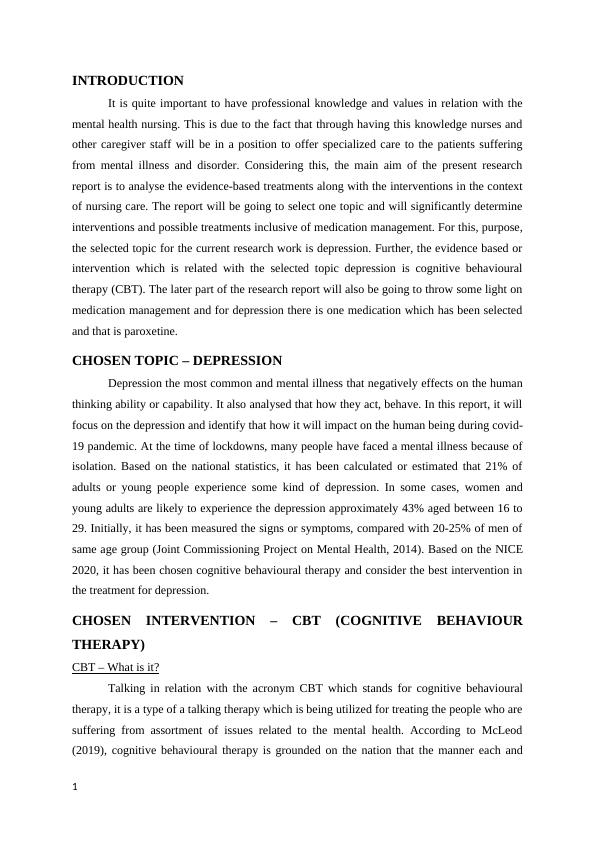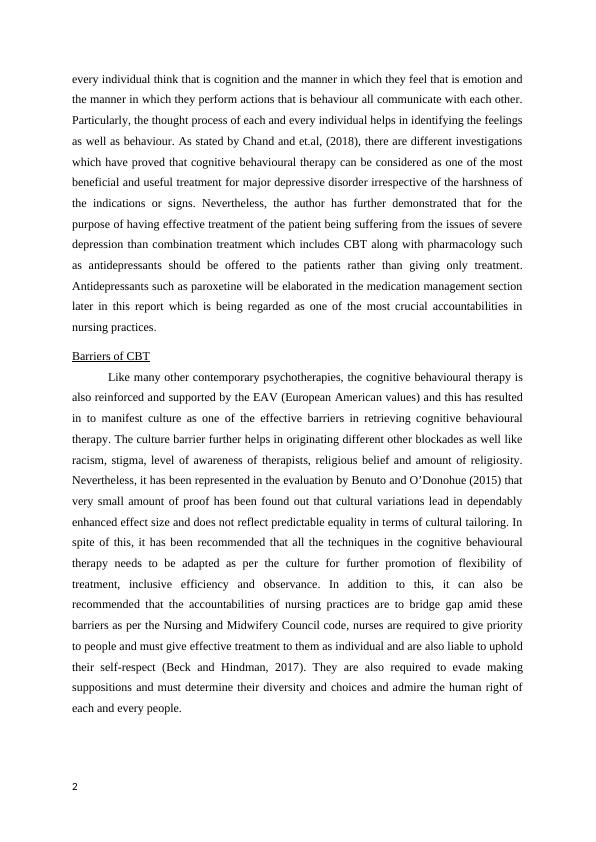Developing Professional Knowledge and Values in Mental Health Nursing
Added on 2023-06-10
12 Pages4092 Words339 Views
Developing professional knowledge and values
in mental health nursing
in mental health nursing

CONTENTS
INTRODUCTION......................................................................................................................1
CHOSEN TOPIC – DEPRESSION...........................................................................................1
CHOSEN INTERVENTION – CBT (COGNITIVE BEHAVIOUR THERAPY)....................1
CBT – What is it?...................................................................................................................1
Barriers of CBT......................................................................................................................2
Strength of CBT.....................................................................................................................2
Limitation of CBT..................................................................................................................3
Psycho-education of CBT.......................................................................................................3
Role of a nurse in CBT...........................................................................................................4
MEDICATION MANAGEMENT OF DEPRESSION.............................................................4
CHOSEN MEDICATION – PAROXETINE............................................................................4
Paroxetine – what is it?...........................................................................................................4
Dosage....................................................................................................................................5
Side effects.............................................................................................................................5
Systematic review of paroxetine............................................................................................6
Medication supply..................................................................................................................6
Role of a nurse in paroxetine administration..........................................................................7
CONCLUSION..........................................................................................................................7
REFERENCES...........................................................................................................................8
INTRODUCTION......................................................................................................................1
CHOSEN TOPIC – DEPRESSION...........................................................................................1
CHOSEN INTERVENTION – CBT (COGNITIVE BEHAVIOUR THERAPY)....................1
CBT – What is it?...................................................................................................................1
Barriers of CBT......................................................................................................................2
Strength of CBT.....................................................................................................................2
Limitation of CBT..................................................................................................................3
Psycho-education of CBT.......................................................................................................3
Role of a nurse in CBT...........................................................................................................4
MEDICATION MANAGEMENT OF DEPRESSION.............................................................4
CHOSEN MEDICATION – PAROXETINE............................................................................4
Paroxetine – what is it?...........................................................................................................4
Dosage....................................................................................................................................5
Side effects.............................................................................................................................5
Systematic review of paroxetine............................................................................................6
Medication supply..................................................................................................................6
Role of a nurse in paroxetine administration..........................................................................7
CONCLUSION..........................................................................................................................7
REFERENCES...........................................................................................................................8

INTRODUCTION
It is quite important to have professional knowledge and values in relation with the
mental health nursing. This is due to the fact that through having this knowledge nurses and
other caregiver staff will be in a position to offer specialized care to the patients suffering
from mental illness and disorder. Considering this, the main aim of the present research
report is to analyse the evidence-based treatments along with the interventions in the context
of nursing care. The report will be going to select one topic and will significantly determine
interventions and possible treatments inclusive of medication management. For this, purpose,
the selected topic for the current research work is depression. Further, the evidence based or
intervention which is related with the selected topic depression is cognitive behavioural
therapy (CBT). The later part of the research report will also be going to throw some light on
medication management and for depression there is one medication which has been selected
and that is paroxetine.
CHOSEN TOPIC – DEPRESSION
Depression the most common and mental illness that negatively effects on the human
thinking ability or capability. It also analysed that how they act, behave. In this report, it will
focus on the depression and identify that how it will impact on the human being during covid-
19 pandemic. At the time of lockdowns, many people have faced a mental illness because of
isolation. Based on the national statistics, it has been calculated or estimated that 21% of
adults or young people experience some kind of depression. In some cases, women and
young adults are likely to experience the depression approximately 43% aged between 16 to
29. Initially, it has been measured the signs or symptoms, compared with 20-25% of men of
same age group (Joint Commissioning Project on Mental Health, 2014). Based on the NICE
2020, it has been chosen cognitive behavioural therapy and consider the best intervention in
the treatment for depression.
CHOSEN INTERVENTION – CBT (COGNITIVE BEHAVIOUR
THERAPY)
CBT – What is it?
Talking in relation with the acronym CBT which stands for cognitive behavioural
therapy, it is a type of a talking therapy which is being utilized for treating the people who are
suffering from assortment of issues related to the mental health. According to McLeod
(2019), cognitive behavioural therapy is grounded on the nation that the manner each and
1
It is quite important to have professional knowledge and values in relation with the
mental health nursing. This is due to the fact that through having this knowledge nurses and
other caregiver staff will be in a position to offer specialized care to the patients suffering
from mental illness and disorder. Considering this, the main aim of the present research
report is to analyse the evidence-based treatments along with the interventions in the context
of nursing care. The report will be going to select one topic and will significantly determine
interventions and possible treatments inclusive of medication management. For this, purpose,
the selected topic for the current research work is depression. Further, the evidence based or
intervention which is related with the selected topic depression is cognitive behavioural
therapy (CBT). The later part of the research report will also be going to throw some light on
medication management and for depression there is one medication which has been selected
and that is paroxetine.
CHOSEN TOPIC – DEPRESSION
Depression the most common and mental illness that negatively effects on the human
thinking ability or capability. It also analysed that how they act, behave. In this report, it will
focus on the depression and identify that how it will impact on the human being during covid-
19 pandemic. At the time of lockdowns, many people have faced a mental illness because of
isolation. Based on the national statistics, it has been calculated or estimated that 21% of
adults or young people experience some kind of depression. In some cases, women and
young adults are likely to experience the depression approximately 43% aged between 16 to
29. Initially, it has been measured the signs or symptoms, compared with 20-25% of men of
same age group (Joint Commissioning Project on Mental Health, 2014). Based on the NICE
2020, it has been chosen cognitive behavioural therapy and consider the best intervention in
the treatment for depression.
CHOSEN INTERVENTION – CBT (COGNITIVE BEHAVIOUR
THERAPY)
CBT – What is it?
Talking in relation with the acronym CBT which stands for cognitive behavioural
therapy, it is a type of a talking therapy which is being utilized for treating the people who are
suffering from assortment of issues related to the mental health. According to McLeod
(2019), cognitive behavioural therapy is grounded on the nation that the manner each and
1

every individual think that is cognition and the manner in which they feel that is emotion and
the manner in which they perform actions that is behaviour all communicate with each other.
Particularly, the thought process of each and every individual helps in identifying the feelings
as well as behaviour. As stated by Chand and et.al, (2018), there are different investigations
which have proved that cognitive behavioural therapy can be considered as one of the most
beneficial and useful treatment for major depressive disorder irrespective of the harshness of
the indications or signs. Nevertheless, the author has further demonstrated that for the
purpose of having effective treatment of the patient being suffering from the issues of severe
depression than combination treatment which includes CBT along with pharmacology such
as antidepressants should be offered to the patients rather than giving only treatment.
Antidepressants such as paroxetine will be elaborated in the medication management section
later in this report which is being regarded as one of the most crucial accountabilities in
nursing practices.
Barriers of CBT
Like many other contemporary psychotherapies, the cognitive behavioural therapy is
also reinforced and supported by the EAV (European American values) and this has resulted
in to manifest culture as one of the effective barriers in retrieving cognitive behavioural
therapy. The culture barrier further helps in originating different other blockades as well like
racism, stigma, level of awareness of therapists, religious belief and amount of religiosity.
Nevertheless, it has been represented in the evaluation by Benuto and O’Donohue (2015) that
very small amount of proof has been found out that cultural variations lead in dependably
enhanced effect size and does not reflect predictable equality in terms of cultural tailoring. In
spite of this, it has been recommended that all the techniques in the cognitive behavioural
therapy needs to be adapted as per the culture for further promotion of flexibility of
treatment, inclusive efficiency and observance. In addition to this, it can also be
recommended that the accountabilities of nursing practices are to bridge gap amid these
barriers as per the Nursing and Midwifery Council code, nurses are required to give priority
to people and must give effective treatment to them as individual and are also liable to uphold
their self-respect (Beck and Hindman, 2017). They are also required to evade making
suppositions and must determine their diversity and choices and admire the human right of
each and every people.
2
the manner in which they perform actions that is behaviour all communicate with each other.
Particularly, the thought process of each and every individual helps in identifying the feelings
as well as behaviour. As stated by Chand and et.al, (2018), there are different investigations
which have proved that cognitive behavioural therapy can be considered as one of the most
beneficial and useful treatment for major depressive disorder irrespective of the harshness of
the indications or signs. Nevertheless, the author has further demonstrated that for the
purpose of having effective treatment of the patient being suffering from the issues of severe
depression than combination treatment which includes CBT along with pharmacology such
as antidepressants should be offered to the patients rather than giving only treatment.
Antidepressants such as paroxetine will be elaborated in the medication management section
later in this report which is being regarded as one of the most crucial accountabilities in
nursing practices.
Barriers of CBT
Like many other contemporary psychotherapies, the cognitive behavioural therapy is
also reinforced and supported by the EAV (European American values) and this has resulted
in to manifest culture as one of the effective barriers in retrieving cognitive behavioural
therapy. The culture barrier further helps in originating different other blockades as well like
racism, stigma, level of awareness of therapists, religious belief and amount of religiosity.
Nevertheless, it has been represented in the evaluation by Benuto and O’Donohue (2015) that
very small amount of proof has been found out that cultural variations lead in dependably
enhanced effect size and does not reflect predictable equality in terms of cultural tailoring. In
spite of this, it has been recommended that all the techniques in the cognitive behavioural
therapy needs to be adapted as per the culture for further promotion of flexibility of
treatment, inclusive efficiency and observance. In addition to this, it can also be
recommended that the accountabilities of nursing practices are to bridge gap amid these
barriers as per the Nursing and Midwifery Council code, nurses are required to give priority
to people and must give effective treatment to them as individual and are also liable to uphold
their self-respect (Beck and Hindman, 2017). They are also required to evade making
suppositions and must determine their diversity and choices and admire the human right of
each and every people.
2

End of preview
Want to access all the pages? Upload your documents or become a member.
Related Documents
Cognitive Behavioural Therapy for Psychosis (CBTp)lg...
|28
|7553
|475
Cognitive Behavioral Therapy: What Is It and Who Can It Help?lg...
|5
|1015
|24
Utility and Clinical Effectiveness of Cognitive Behavioural Therapy (CBT) in Treating Common Mental Disorderslg...
|12
|3383
|247
Effectiveness of Cognitive Behavioral Therapy in Treating Depression in Older Patients with Dementialg...
|16
|3671
|490
Cognitive Behavioral Therapy Case Study 2022lg...
|8
|1976
|24
Treatment of Depression: Cognitive Therapy vs Antidepressantslg...
|12
|2851
|323
